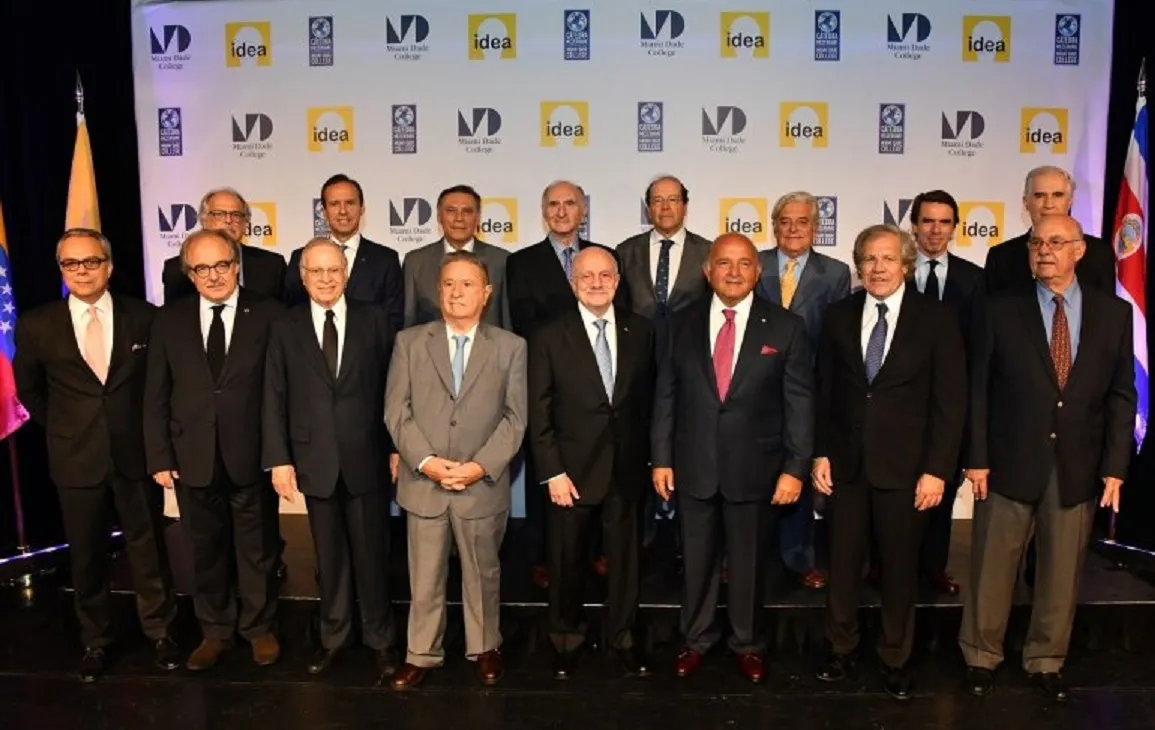The Presidential Dialogue on Reinvention of the Political Parties

The Regional Director of International IDEA for Latin America and the Caribbean, Dr Daniel Zovatto, participated along with a large group of former presidents and heads of state of Latin America and Spain, the Secretary General of the OAS and regional leaders, at the Second Presidential Dialogue: Towards Reinventing the Political Parties, organized by the Cátedra Mezerhane at Miami-Dade College. Participants analyzed the future of the political parties and the challenges they face along with the current state of democracy in Latin America and the Caribbean. The dialogue also produced recommendations for overcoming the disenchantment with democracy among citizens.
Este articulo se encuentra disponible en Castellano.
Almost 40 years since the onset of the Third Wave of democracy in Latin America the political parties, which constitute a key institution of representative democracy, find themselves amidst a profound crisis that requires that they reinvent themselves.
This was precisely the main topic of discussion at the Second Presidential Dialogue, held in Miami, Florida, on October 26 2017. Under the heading “Towards the Reinvention of the Political Parties,” the conference was organized by the Cátedra Mezerhane sobre Democracia, Estado de Derecho y Derechos Humanos (at Miami-Dade College), Idea Iberoamérica, and Miami-Dade College.
Overall, nine former presidents and heads of state from Latin America and Spain participated, along with Luis Almagro, Secretary General of the OAS; Asdrúbal Aguiar, Director of the Cátedra Mezerhane sobre Democracia, Estado de Derecho y Derechos Humanos; Nelson Mezerhane, President of both the Cátedra and Diario las Américas; Eduardo J. Padrón, President of Miami-Dade College; and well-known academics and businesspersons. International IDEA was represented by its Regional Director for Latin America and the Caribbean, Dr Daniel Zovatto.
The conference was organized around two main panels. The first, under the heading “The political parties, between regulations and disenchantment,” addressed the challenges parties currently face, both endogenous and exogenous. Also discussed was the urgent need to carry out reforms aimed at reconnecting parties with citizens so as to attempt to recover their credibility, legitimacy, and efficacy.
The initial presentation was entrusted to Diego Valadés, President of the Instituto Iberoamericano de Derecho Constitucional. The speakers were former president of Uruguay, Luis Alberto La Calle; former president of Argentina, Fernando de la Rúa; former president of Ecuador, Jamil Mahuad; former president of El Salvador, Alfredo Cristiani; and the former president of Costa Rica, Miguel Ángel Rodríguez.
The discussion among the former presidents was moderated by Dr Daniel Zovatto, who by way of introduction emphasized the central role of political parties in a representative democracy, as recognized in Articles 3 and 5 of the Inter-American Democratic Charter. Article 3 indicates that “the pluralistic system of political parties and organizations” is one the “essential elements of representative democracy,” whereas Article 5 expressly establishes that “The strengthening of political parties and other political organizations is a priority for democracy.”
The moderator also mentioned the crisis of credibility and legitimacy the political parties face, as well as the major decline in the numbers of people identifying with one or another party. In effect, according to a recent survey by the Latin American Public Opinion Project (LAPOP), only 20 per cent of the persons interviewed trust political parties, and only one in three Latin Americans identifies with a party.
During the discussion the panelists agreed with this assessment and made a series of recommendations aimed at overcoming this serious crisis, noting that without modern, strong, and democratic parties, and without a duly institutionalized political party system, there is no possibility of having quality democracy. They also warned of the danger of independent candidates appearing on the scene who, with a discourse of anti-politics, may get elected with populist proposals strong in nationalist content, like what is happening in other regions of the world, including the United States and Europe.
Among the important issues addressed during the dialogue among the former presidents, special mention should be made of the following:
(1) the need to strengthen the mechanisms of internal democracy; (2) the importance of adequately regulating the relationship between money and politics, especially the financing of political parties and election campaigns; (3) being alert to the positive aspects but also the risks of social networks; (4) caution (because of the dangers that accompany the misuse of these mechanisms) when it comes to using the instruments of direct democracy for trying to cure the deficits of representative democracy; and (5) the importance of achieving greater gender equity and greater participation of youth in competition both within and among political parties.
The second panel addressed “Digital Civil Society and the Challenge facing Political Parties”. The Secretary General of the OAS introduced the topic and the panelists were former president of Spain José María Aznar; former president of Bolivia Jorge “Tuto” Quiroga; former president of Ecuador Osvaldo Hurtado; and former president of Argentina Eduardo Duhalde.
The day ended with the former presidents’ thoughts on the main challenges political parties face with a more demanding citizenry and recommendations for overcoming the current disenchantment with democracy.



